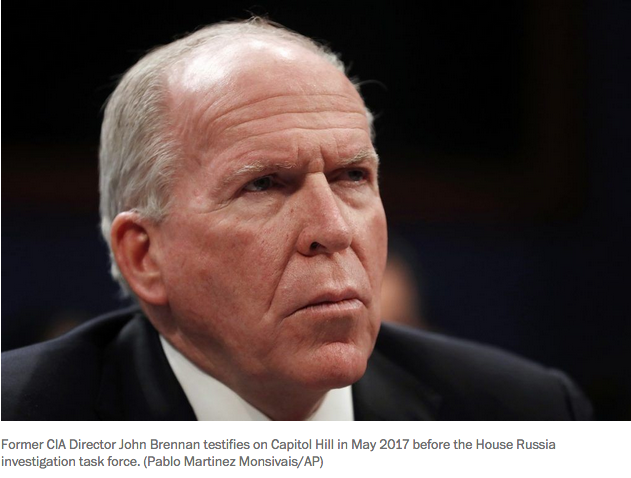Former CIA director John Brennan said Sunday that he’s considering “going to court” to challenge President Trump’s decision to strip him of his security clearance. If he does, plenty of lawyers with expertise in security clearance cases stand ready to help him.
“There’s a ton of us who would do it pro bono,” Mark Zaid, one of the nation’s leading litigators in the field, told The Washington Post Sunday night.
“I’d be privileged to have him as a client,” said R. Scott Oswald, who specializes in defending whistleblowers at the Employment Law Group.
But none of the attorneys interviewed by The Washington Post in the wake of Brennan’s comments were confident that Brennan, or any of the other officials and former officials threatened by Trump, would prevail in the end.
The deference the courts have traditionally shown the president in matters of national security presents a formidable obstacle, they said, citing in particular a 1988 ruling by the Supreme Court in Department of the Navy v. Egan, in which the justices said, in Zaid’s words, that judges “don’t have the expertise” to adjudicate clearances and “should not be trying to insert” themselves in the process.. . .“Right now,” said Oswald, “we don’t have anything formalized that describes the reason for the revocation. And importantly, the executive order requires that.”
. . .
“Right now,” said Oswald, “we don’t have anything formalized that describes the reason for the revocation. And importantly, the executive order requires that.”
The executive order to which he referred was promulgated by President Bill Clinton and later amended in 2008. It sets out a process which, if followed by the administration, could take years to play out, said Zaid.
It requires, with a major escape hatch to be sure, that those facing revocation shall be provided, among other things:
A “comprehensive and detailed a written explanation” of the decision.
Notice of their right to be represented by a lawyer at their own expense.
The chance to request “any documents” and reports . . . “upon which a denial or revocation is based.”
A “reasonable opportunity to reply in writing, and request a review” of the decision.
A right to appeal to a “high level panel” appointed by the head of the relevant agency, presumably in Brennan’s case, the CIA.
An opportunity “to appear personally” and present materials before “an adjudicative or other authority.”




